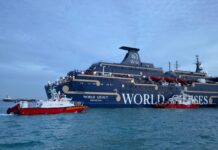
The Indian government’s abrupt decision earlier this month to ban/restrict wheat exports, as part of its measures to contain raging inflation in the country, has caused mayhem at terminals in some of the country’s western port locations.
Kandla Port, also known as Deendayal Port, a gateway government in Gujarat State, has become the centre point of this disruption. According to sources, vessels already at berth, in the midst of loading or waiting to load, have found themselves stranded for days, while the fate of vessels en route to the port to pick up wheat cargo has been left to government reconsideration.
The chaos also led to long truck queues outside terminal gates in Kandla, after authorities had begun turning truckers away.
According to the latest update from local sources, while some vessels have been able to secure clearances and sail out, a few vessels – reportedly four – continued to remain stuck in the harbour as of 25 May, waiting for permissions to berth and pick up the cargo they had contracted to carry.
The amended wheat export policy came into effect on 13 May, catching both traders and vessel operators unawares.
“As a transitional arrangement, exports will be allowed in case of shipments where Irrevocable Letter of Credit has been issued on or before the date of this notification, subject to submission of documentary evidence,” the decree stated.
But there was initially little clarity for the authorities on how this notification restraining exports would be implemented. “Despite all the clearances in place, some of the vessels were not being allowed to sail or berth, raising the risk of avoidable demurrage charges,” a local trader told Container News.
Sensing the challenges, some Indian export houses have invoked force majeure clauses in their contracts that would protect them in case they are unable to honour shipment commitments. Force majeure typically applies to situations where one party cannot uphold its side of a contract because of unforeseeable events or circumstances outside of its control.
At the same time, the authorities have warned traders/shippers about manipulating shipping documents in order to secure export clearances.
“Information has been received from sources that fraudulent back dated Letter of Credit (L/C) showing date of issuance, as on or prior to 13 May, are being submitted by some unscrupulous for issue of RCs (Registration Certificates),” the Directorate General of Foreign Trade (DGFT) said in a new trade notice.
According to sources, some one million tons of wheat cargo remains stranded at Kandla and traders are hoping to convince government authorities to cancel the export ban.
Jenny Daniel
India correspondent
Contact email: j.daniel@container-news.com




